Sex. Housekeeping. The kids. That one weird relative. The freaking toilet. AGAIN. Chances are, you’ve argued with a partner about one or more of these along your human journey. Or maybe it was someone’s food choices, how they spent or saved money, or their tone of voice. (I’m looking at me.) Friction in relationships is not just common but normal, and experts say it’s not the topic of disagreement that matters as much as the form of the conflict. In reality, the subject of the squabble is just a foil for deeper, more meaningful issues, and getting those out in the open is the higher goal.
I’m no therapist. I don’t even play one on TV. So, I’m not here to tell you how to stop being a turd, or to teach you how to fight fairly, with better results. That advice is out there in droves and essentially boils down to cultivating compassion, respect, and the ability to communicate both.
Instead, I want to tell you about a simple trick that has proven effective at ending fights in my marriage of thirty-two years, and has surely saved our shins in the process. Realizing that the highly personal and situation-specific nature of this topic puts me at risk of having insufficient perspective, I will offer a few disclaimers before I sally forth:
We still argue.
He can be an intolerable mule.
I can be an acute (not “a cute”) pain in the butt.
We respect each other a lot - more often than not.
That last one can be a game changer. When discourtesy and lack of trust have let the glue ooze out of a relationship, or when one partner is currently unwilling or unable to help replenish it, it’s harder to keep things from coming undone.
No two partnerships are alike. Certain circumstances require more relational intention than others. (Been there, done that.) Some unions are running off the fumes of former devotion. This probably isn’t the first tool to reach for at those times. But, it might be one to pull out of your collection after more urgent repairs have been managed.
I haven’t yet settled on a name for this intervention, if that’s what it is, but for now, I’m calling it the Borge Method™, after Victor Borge, the Danish-American comedian who rose to fame in the 1940s. It blends two of his most notable contributions to our world, overt punctuation and humor, and like all comedy, it allows laughter to take some of the sting out of reality.
Predicated on a desire for earnest communication, together with a conciliatory mindset, this approach is accessible at all times, is completely non-verbal, at least initially, and doesn’t ask you to stare into someone’s eyes for minutes at a time. You don’t have to be ready to hug anyone, let alone kiss and make up. In fact, you can still be feeling pretty frosted about whatever it is that went down. But you do have to want to remedy that.
Here’s a scenario: A disagreement starts when you say something prickly. Your cactus imitation pokes your partner’s last nerve, and before you know it, insults are flying. I never…! You always...! By the time you’ve run out of steam, or stormed off, it’s hard to remember what started it all.
That’s when the Borge Method kicks in. After the immediate wave of friction has subsided, but before things have been put fully to rights, one of you reaches for a piece of paper. Your purpose is to add bit of punctuation, something to break up the tension and introduce a new thought. This is your chance to insert a comma, a gentle pause, in the conflict. Or maybe you’d prefer a period, full stop. An exclamation point really drives your point home, if you’re ready for that. Whatever you choose, by employing it you have the power to shift the tone and guide the direction of the rest of the story.
I described my attachment to note-leaving in last week’s essay. For me, it is almost instinctual. At one time, I was the one initiating this behavior. But, after three decades together, the practice now goes both ways. It’s our way of releasing a metaphorical dove into the room, a grace period, when words are hard to find.
Over the years, we’ve amassed a collection of a dozen or so paper olive branches, notes that worked well in the moment and were, therefore, kept for future use. We’ve saved cocktail napkins -- the mix of adult beverages and social expectations at events where we gathered them having brought out some of our best, most despicable, moments. Once in a while, a new creation will come forth, to make sure the audience doesn’t get tired of the jokes.
It’s worth mentioning that this technique would be ineffective in the absence of a few complementary (also, complimentary) practices. Mixing a dash of praise into the days, here and there, captures attention and affirms commitment. And, most important of all, notes are never meant to be a substitute for real conversation. Rather, they act as bridges to take us where we’re trying to go. Talking – and listening – are waiting on the other side.
Perhaps you have other tactics you call into action when the situation gets heated, like cupcakes, or bowling. Maybe you go for mutual pedicures, or recite Shakespeare. The specifics don’t much matter as long as you find what works for you. I just know that when you’re crafting an epic tale, with page after page of heroes and adversaries, adventures and upheavals, you are going to need all the punctuation you can get.
~Elizabeth

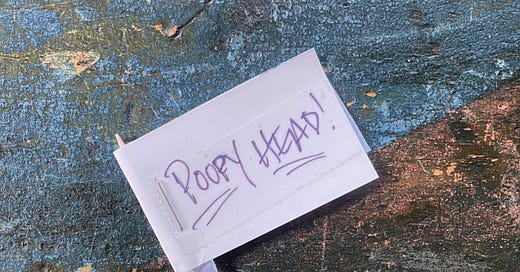



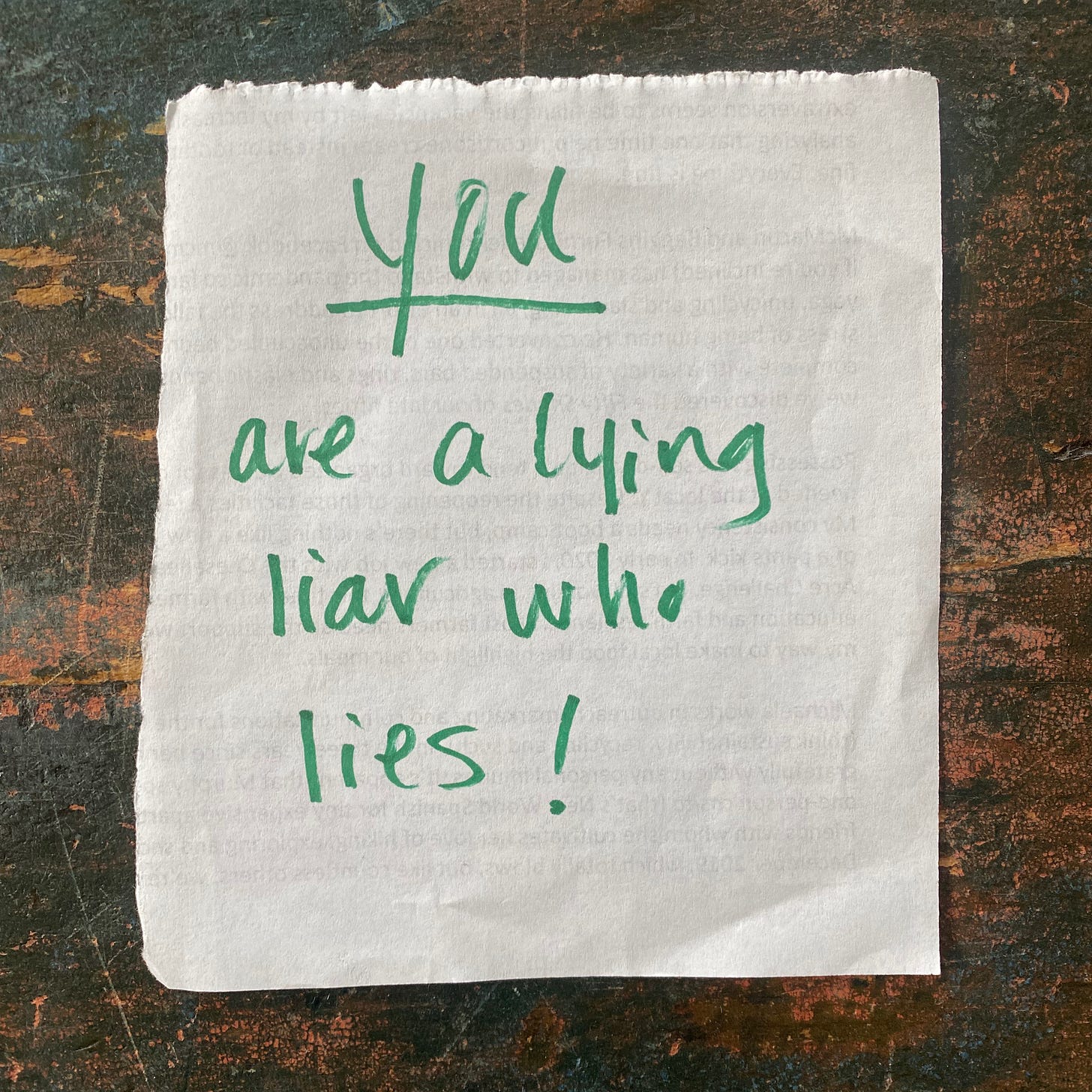
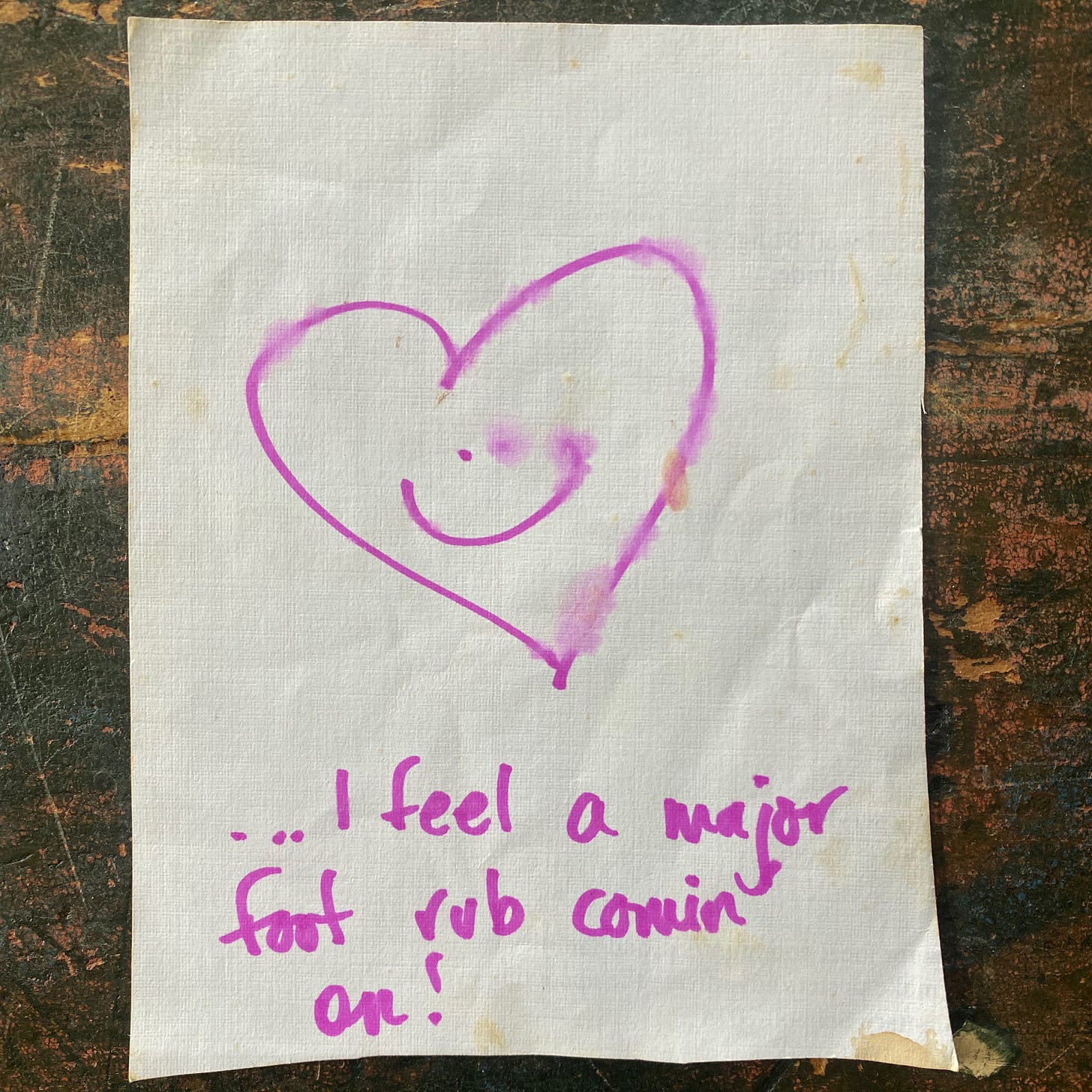
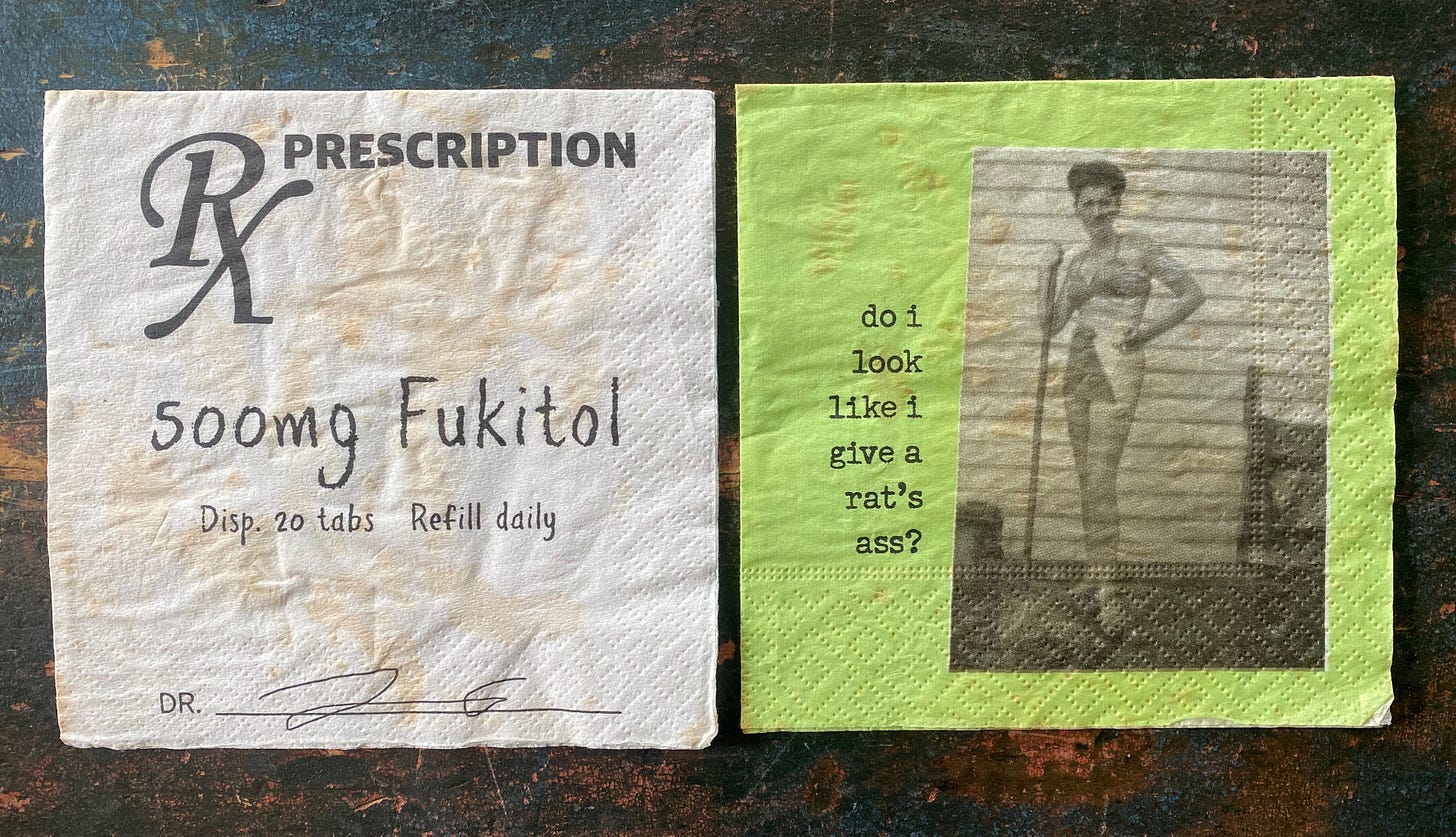
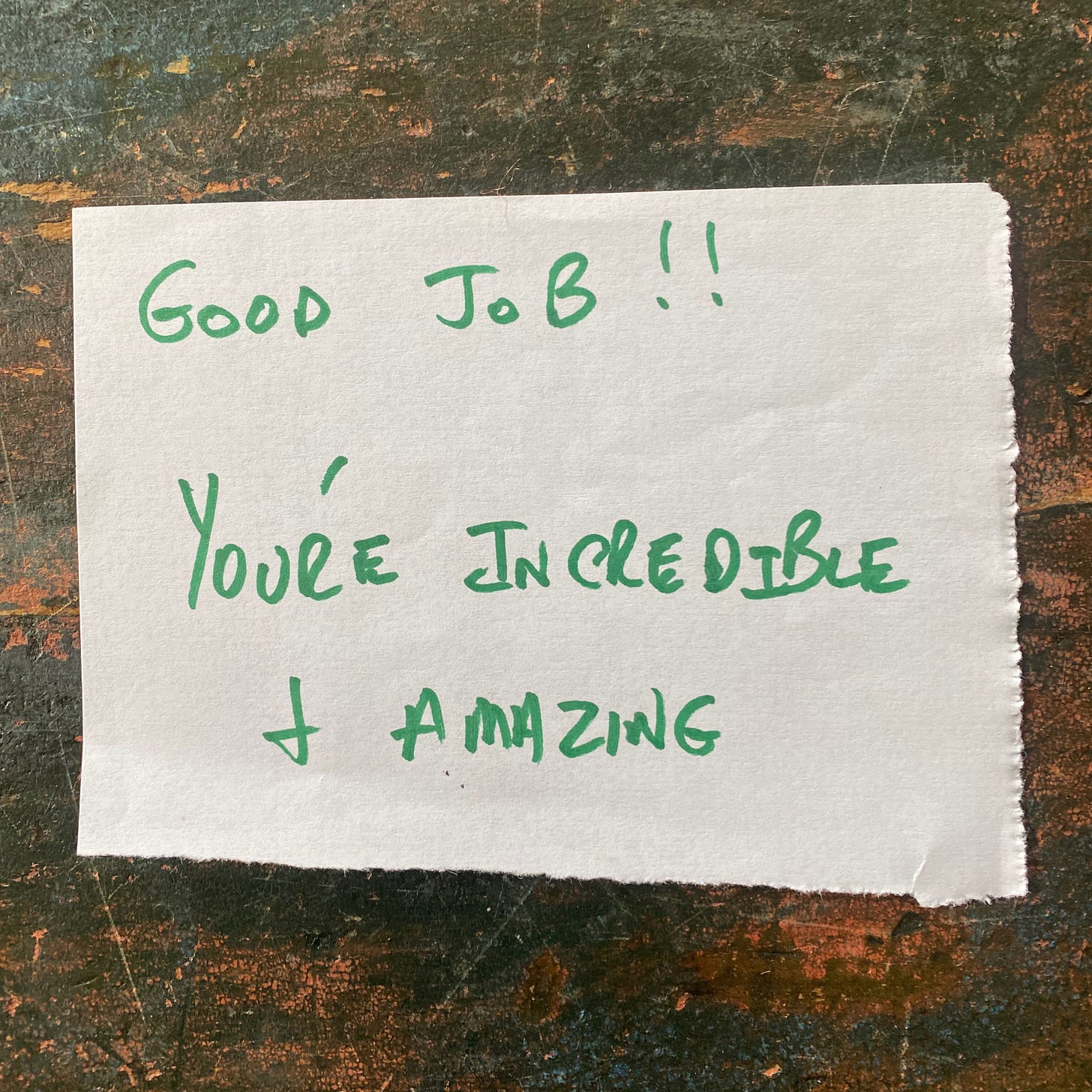
Your isolation assignment without communication sounds so good.... first of all I'm congratulating you on that and praying for your body and mind and spirit to have a blast. Your blog is humorous and sincere and wonderful. As you often do, you dangled a line in which I found the perfect answer.. " it allows laughter to take some of the sting out of reality." Amen
So clever. So sensible.
OH and I leave the odd love note here and there when one of us is going somewhere or just because we want to support each other - not a lot but enough to make it mean something. And my husband is so very very good at writing the perfect poem on birthday and Christmas cards. The kind that one has to keep in a pile wrapped up with ribbon in a special box.
But I had never thought of notes to defuse a situation. I'm taking it on board. We've been together for 47 years and such a technique might be fun (and constructive) to introduce.
I should also say I grew up with Victor Borge and Dad and I shared such laughs when listening to his 45's on Dad's radiogram. Thank you for the link - that bought back some lovely memories.